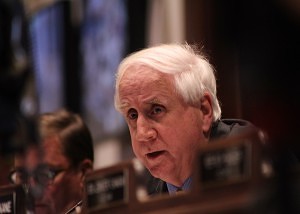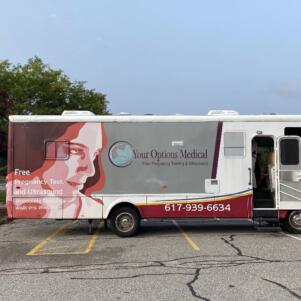Assisted suicide bill draws heartfelt testimony pro and con
By Evan Lips | October 27, 2015, 21:04 EDT
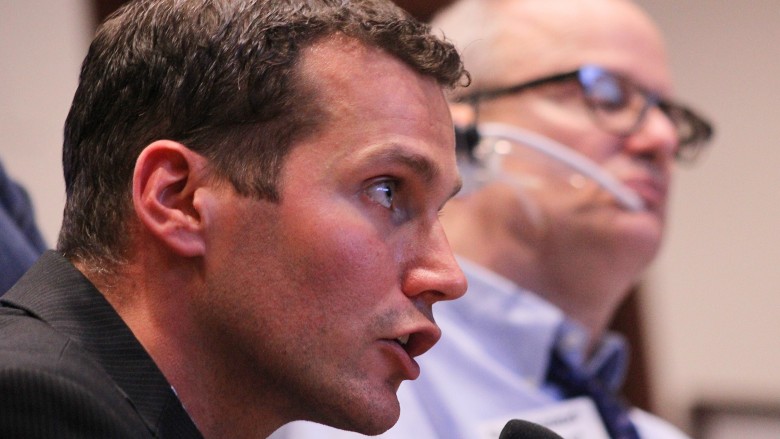 JJ Hanson (left), a marine veteran, was one of dozens who spoke out at a public hearing against a bill that would let doctors prescribe lethal doses of medications to the terminally ill. Hanson, diagnosed with terminal brain cancer, was given four months to live in May 2014. (NewBostonPost photo by Evan Lips)
JJ Hanson (left), a marine veteran, was one of dozens who spoke out at a public hearing against a bill that would let doctors prescribe lethal doses of medications to the terminally ill. Hanson, diagnosed with terminal brain cancer, was given four months to live in May 2014. (NewBostonPost photo by Evan Lips) BOSTON – One man is a U.S. Marine Corps veteran waging his final battle, a bout with terminal brain cancer, refusing to give in despite a deteriorating quality of life.
The other man is a North Shore police officer who recalled how his Alzheimer’s-stricken father, a former police chief, could have been spared from unnecessary suffering had a legal option allowing him to kill himself existed.
Marine veteran JJ Hanson and Swampscott Police Det. Sgt. Timothy Cassidy joined more than 50 people who spoke for and against physician-assisted suicide at a State House hearing Tuesday. The witnesses testified to the Joint Committee on Public Health over a proposal to make the practice legal in Massachusetts, adding the state to a growing list of those that let doctors help terminally ill patients end their lives by prescribing lethal drugs.
The four-hour hearing drew emotional, heart-wrenching testaments from both supporters and opponents. While some said the measure would help people seeking to avoid a painful death, others said unintended consequences could easily arise when insurers are left to choose expensive, life-prolonging treatments or cheap, fatal drugs.
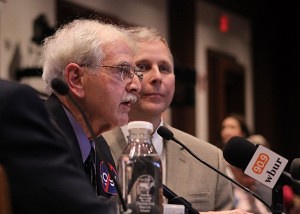
Dr. William Lawton, left, was one of four physicians, along with Dr. Paul Carpentier, right, to testify against the bill, joining Dr. Laura Lambert. (Evan Lips – New Boston Post)
Worcester Dr. Laura Lambert, a surgical oncologist, said the measure “runs the risk of creating a societal expectation of a duty to die” and urged lawmakers to “protect all citizens of Massachusetts from this death-panel-in-a-bottle.” But medical professionals are split on the issue, just as people like Hanson and Cassidy.
Dr. Jeffrey Gold, a family physician from Swampscott, countered Lambert, saying “the biggest harm I can ever do to a patient is to not give them a choice.”
“There’s a reason why we have the term ‘rest in peace,’” Gold added. “And who are we to get in the way of that?”
House Bill 1991, an “act affirming a terminally ill patient’s right to compassionate aid in dying,” was reintroduced by state Rep. Louis Kafka (D-Stoughton) in January, his fourth attempt to move the measure into law over six years. In testifying for the legislation, Kafka said he proposed it in honor of Al Lipkind, a constituent who had urged him to help enact a Massachusetts law similar to an assisted-suicide law in Oregon before succumbing to cancer.
Massachusetts voters narrowly defeated a ballot measure similar to the Oregon statute, 51 percent to 49 percent, in 2012.
Both sides of the debate brought up Oregon’s law throughout the hearing. Kafka’s proposal would let anyone 18 or older and diagnosed by a physician with a terminal illness and given six months or less to live ask for and receive a lethal dose. Kafka said the fatal medication could come in drinkable form. Under his proposal, the patient could ingest the medication alone if preferred and would not be required to consult with family members.
The patient would, however, have to submit to a psychiatric evaluation to ensure an informed decision uninfluenced by depression or other mental afflictions.
“My constituent Al Lipkind passed on Oct. 22, 2009, and I don’t know if he would have chosen to end his suffering any earlier than that,” Kafka told the committee. “But it is a choice he never had and I’m sure he would be very happy to know that we are now once again testifying before this committee to give the residents of the commonwealth that choice.”
Kafka’s proposal has the backing of at least 38 lawmakers. Four of them testified Tuesday. But some legislators voiced skepticism, including state Rep. James Lyons (R-Andover), a member of the public health panel. At the hearing, he grilled Kafka over the measure’s provision letting a patient ingest the medication in solitude.
“The law is called the Massachusetts Compassionate Care for the Terminally Ill Act but so far what we know is that a patient will take this medication by themselves with no family members around,” Lyons said, drawing some howls from the crowd of supporters. “The bill says an individual can make this choice and doesn’t even have to tell their family.
“What we’re doing is putting forth legislation and calling it compassionate care for the terminally ill and what I’ve just described doesn’t appear to be compassionate.”
Kafka did acknowledge that patients under the proposed law would not be required to contact family members before taking a lethal dose.
Others who spoke for the bill, like Christine Poff, Massachusetts political director for the National Association of Social Workers, said laws are not made “based on our personal beliefs or emotions.”
“This about our clients’ and our constituents’ feelings and needs,” Poff said.
Dr. Joan Berzoff, a therapist who teaches in Smith College’s School for Social Work in Northampton, pointed out that California recently passed end-of-life legislation similar to Kafka’s proposal. Berzoff also mentioned Brittany Maynard, a California woman who made headlines last year for her decision to move to Oregon in order to take advantage of the state’s assisted suicide law. Maynard had terminal brain cancer.
“Having the potential to control their own demise is an enormous relief to the terminally ill,” Berzoff said.

Christine Poff, right and Dr. Joan Berzoff, left, of the National Association of Social Workers testify as an audience member, center, listens. (Evan Lips – New Boston Post)
Berzoff also cited a U.S. Supreme Court ruling that legalized abortion.
“The Supreme Court has upheld that women should have control over their bodies and has upheld the view that medical treatment cannot be forced upon us,” she said. “Why then can’t a dying person, whose wishes are clear and who meets strict guidelines, exercise the same control over his or her death?”
“This is not euthanasia or suicide,” she said. “This is a right to make personal and private decisions at one of life’s most crucial moments.”
Stephen Mendelsohn of Second Thoughts Connecticut, which opposes assisted suicide, identified another concern: the fear that legalized euthanasia could become the preferred alternative for health care providers when it comes to end-of-life care.
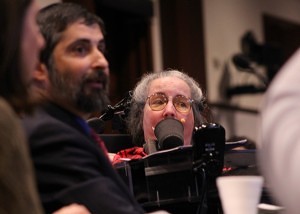
Stephen Mendelsohn, left, and Cathy Ludlum, center, of Second Thoughts Connecticut. (Evan Lips – New Boston Post)
“What about the person with Parkinson’s disease, who will have tremors for years before dying,” Mendelsohn said. “Once the door to assisted suicide is pried open in enough states Compassion & Choices will seek to open it further through the courts, from six months left to live to a year, to five years.”
Compassion & Choices is a national nonprofit group that supports “patient’s rights and choices at the end of life,” according to its website.
Barbara Coombs Lee, the organization’s national director, has said assisted suicide opponents sensationalized the death of Oregon resident Barbara Wagner. Wagner relied on the state-federal Medicaid health insurance program for the poor and disabled. After being diagnosed with terminal lung cancer in 2008, the state denied a $4,000-per-month treatment prescribed by her doctor that may have extended her life.
Medicaid administrators in Oregon instead notified Wagner and told her she would instead be eligible for the $50 it would cost to obtain enough lethal medicine to end her life.
In his testimony to the committee, Maynard’s widower, Dan Diaz, said his late wife’s brain tumor grew aggressively and added that had they stayed in California the “tumor would have ended Brittany’s life in a brutal manner.”
Diaz said Maynard wanted her passing “to be gentle” and stressed that terminally ill people have said they are only seeking to have more control over their own lives. He spoke about Jennifer Glass , another Californian, who was diagnosed with terminal cancer and did not have the ability to control her own death.
Diaz recalled an August visit with Glass at a hospital, where she had requested a “terminal sedation,” or to be placed in an induced coma without being given food or water.
“That was the only option available to her in California,” Diaz said. “Jennifer died later that night but that was not the dying process she wanted. My wife passed away gently. Jennifer’s death was not as gentle.”
Hanson, the ex-marine who spoke out against Kafka’s legislation, testified that he was diagnosed 18 months ago with the same type of cancer, grade-4 glioblastoma, as Maynard.
“I’m here to tell you I do not want to die,” he said, adding that he was given four months to live in May 2014. “I had two different doctors tell me there was nothing I could do about it and that I should go home and enjoy what little time I had left with my family.”
“Fortunately, I did not accept their prognosis,” he said.
Hanson said too many patients “would have listened to those doctors and would have given up” and added that he lived through days, following a seizure, where he couldn’t walk or talk.
“If this legislation was legal at the time I could have had doctor-prescribed suicide pills on my nightstand,” he said. “I would have had them with me as I laid in bed during month five and questioned whether life was worth living.”
Hanson said he would be dead if the pills had been available.
“You can’t unmake that decision,” he said. “I’m here to point out the dangers when assisted suicide becomes the norm for terminally ill patients.”
The committee now has 10 days before it must decide whether or not to issue a favorable report, which would move the bill closer to a vote by the full House of Representatives. If it passes the legislature, Massachusetts would join California, Montana, Vermont and Washington in following Oregon’s lead.
Contact Evan Lips at [email protected] or on Twitter at @evanmlips
NBPValueoflife


